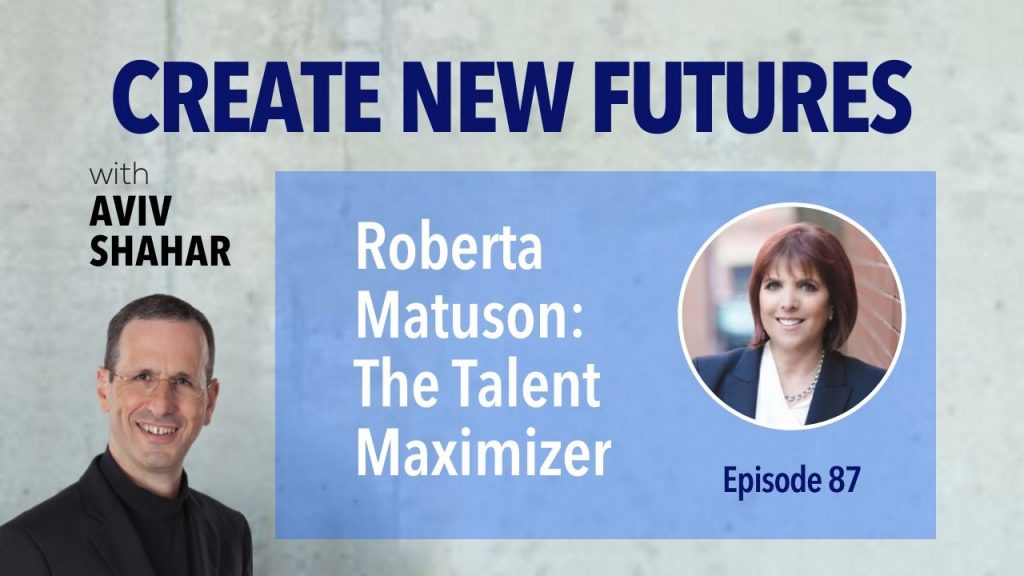Hi Leader,
How applying my Air Force learning enables my clients to operate at the highest level during a crisis
We apply two critical Air Force practices:
✔️Practice 1 - talking out loud in the cockpit
- Pivot from the myopic flight/fright/freeze response to engage the strategic, analytical, decision-making part of your brain.
- What is the best practice for leading a control tower or commend center process? What roles do data and verbal pace play?
- How you can apply the talking out loud practice.
✔️Practice 2 - debrief learning daily/continuously
- What worked well? Where did we experience gaps?
- What are the learnings from our successes and from our failures?
- How will you apply those learnings?
How will you embrace these Air Force practices to enable you to unleash the power of your learning?
The Talent Maximizer Roberta Matuson
" The first trend is that you have to actively seek out talent. Those days of positioning yourself as, 'Oh, people would be so lucky if they got to work here' are long gone. And so, you have to actively promote yourself as a leader and your brand as well as the employer brand and you have to actively attract people to your organization."
Listen Here: Episode 87 - Roberta Matuson: The Talent Maximizer
Episode Summary:
Roberta Matuson is a global strategist, advisor, best-selling author and the president of Matuson Consulting, where she has helped leaders in Fortune 500 companies, including Best Buy, GM, and New Balance. Known as the Talent Maximizer, Roberta in an expert in helping her clients achieve dramatic growth and market leadership through the maximization of talent.
In this episode, Aviv and Roberta expound on her work in the field of talent management and retention. They dive deep into the elements that factor into a satisfying work environment, including having a great manager, autonomy and a sense of purpose. Finally, Roberta provides her thoughts on the incoming generation of workers and best practices for employers to prune their workforce.
Key Takeaways:
01:44 - Roberta reflects on her background in talent evaluation as well as what she enjoys most about her work
05:24 - Roberta speaks to the biggest lesson from her best-selling book, Suddenly in Charge
07:13 - The top three trends in talent development today
08:46 - The decision to write the book, Evergreen Talent, and key messages and takeaways about talent
11:45 - What the best companies are doing to attract and retain top-talent
14:39 - Roberta shares her thoughts on how different generations are interacting together in the workforce and best practices for improved relationships
19:19 - Elements that factor into a satisfying work environment
22:26 - Strategies for pruning the workforce and critical mistakes that prevent companies from cultivating evergreen talent
27:08 - Critical competencies and skills that new workforce entrants must master
30:02 - Two learnings Roberta values above all others
31:45 - Parting words of wisdom from Roberta
Tweetables:
"I really enjoy helping organizations create workplaces where employees love to come to work and customers love to do business." (02:04)
"The big message [of Suddenly in Charge] is that if you don't manage up, meaning managing your boss and the relationships above you, you won't have to worry about managing down because you won't have a job. For me, I was taken out by a wave I never saw coming. And that wave was the people above me in the organization and some of my peers." (06:13)
"The first trend is that you have to actively seek out talent. Those days of positioning yourself as, 'Oh, people would be so lucky if they got to work here' are long gone. And so, you have to actively promote yourself as a leader and your brand as well as the employer brand and you have to actively attract people to your organization." (07:25)
"I think a lot of companies are still using practices back from the 1980s to try to attract and retain talent and clearly it's not working." (11:35)
"Employee engagement is not a program, it's an outcome." (20:27)
© Aviv Shahar



